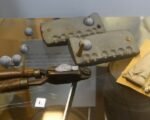This week, archaeologists and historians have made some remarkable discoveries that shed new light on the past. From a 1,900-year-old knife with runic inscription in Denmark, to a Roman toilet spoon in Wales, to a jade mask in the tomb of a Maya king in Guatemala, these finds reveal the diversity and richness of human cultures across time and space.
A Knife With The Oldest Runic Inscription In Denmark
Rógvi N. Johansen/Museum Odense
The knife was found in a grave on the island of Funen in 2021, but its inscription was only revealed after cleaning off the rust.
A knife that was unearthed in 2021 from a grave on the island of Funen in Denmark has turned out to be a rare and valuable artifact. After cleaning off the rust, researchers discovered that the blade had a runic inscription that dates back to around 150 C.E. This makes it the oldest runic inscription ever found in Denmark, and one of the oldest in the world.

The inscription spells out “hirila”, which means “little sword” in Old Norse. The knife was probably a personal possession of the person buried in the grave, who lived during the Roman Iron Age. The inscription shows that the runes were already in use in Scandinavia at that time, and that the people there had contact with the Roman Empire.
The knife is now on display at the Museum Odense, where visitors can admire this unique piece of history.
A Roman Toilet Spoon In Wales
Museum Wales
The Roman toilet spoon may have served a number of different purposes in ancient Britain.
A metal detectorist in South Wales made an unexpected discovery in June 2020, when he found a silver object that looked like a spoon. It turned out to be a Roman toilet spoon, a curious ancient tool that had multiple uses.
The spoon was probably made in the first or second century C.E., when Britain was part of the Roman Empire. It may have been used for personal hygiene, such as cleaning the ears, nose, or teeth. It may have also been used for medical purposes, such as applying ointments or extracting foreign objects from the body. Some scholars even suggest that it may have been used for magic or divination, as it has a hole in the handle that could have held a string or a charm.
The spoon has been declared a treasure in Wales, along with other items found recently in the Vale of Glamorgan. It will be acquired by the National Museum Wales, where it will join other Roman artifacts from the region.
A Jade Mask In The Tomb Of A Maya King In Guatemala
Rubén Salgado Escudero
The mask was discovered in an ancient pyramid in Guatemala that had been looted by grave robbers.
Archaeologists studying the ancient site of Chochkitam in Petén, Guatemala, made a stunning discovery in 2023, when they found a jade mask in the tomb of a Maya king. The mask was part of a rich burial that included pottery, jade beads, shells, and bones.
The mask was made of interlocking pieces of jade that formed the face of the ruler, who lived around the seventh century C.E. The mask had holes for the eyes, nose, and mouth, and was decorated with symbols of the Maya cosmology. The mask may have been worn by the king during ceremonies, or placed on his face after death to help him in his journey to the underworld.
The mask was found in a pyramid that had been looted by grave robbers, who had missed the inner chamber where the tomb was located. The archaeologists were able to document and preserve the mask and the other artifacts, which offer new insights into the Maya culture and history.














